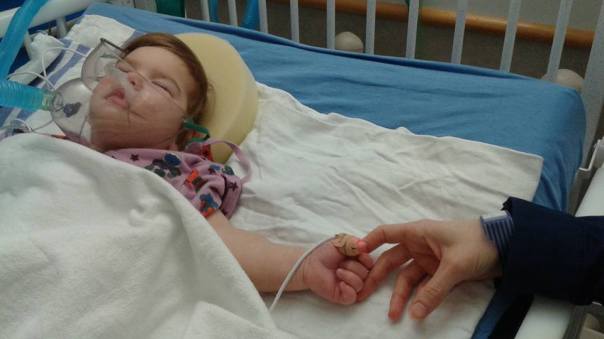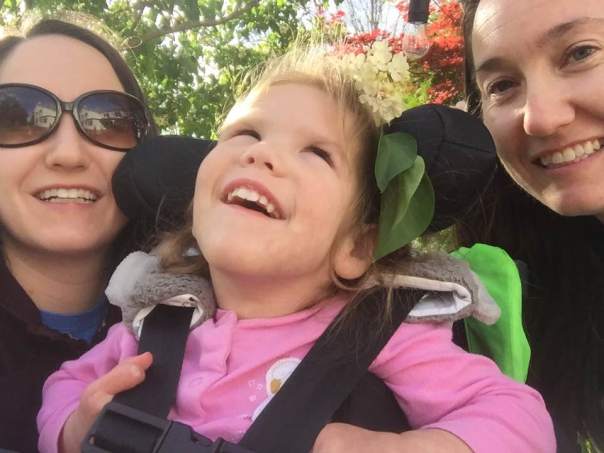I remember the box that the nurse from Medicaid checked when she came to evaluate Lucia–it read something like “qualifies for institutionalized level of nursing/medical care.” She’d been so empathic and caring, so visibly at ease seeing and talking about a child that was on a feeding tube and yet puked the contents of her stomach uncontrollably while we talked in my dining room. But when she left my heart skipped a beat–did she check that box because she thought Lucia belonged in an institution? I thought she’d been there to process Lucia’s Medicaid. Sure no one was going to take our child away?
When we spoke over the phone a few days later she explained that she had to check that box for Lucia to qualify for the highest level of nursing care. She explained to me that while many years ago kids like Lucia couldn’t be cared for in their homes, today modern technology, skilled in-home nursing care, and the Managed Long Term Special Services (MLTSS) Medicaid program in New Jersey were trying to do just that–support families with children with special needs to allow them to care for their children at home.
Looking back I don’t remember being particularly fazed by the severity of Lucia’s medical needs. Growing up with my own health problems, a twin sister with asthma and respiratory problems, and a mother with multiple sclerosis (who is also a nurse!), I think I learned that while health challenges were part of life they didn’t prevent a person from being a person. We had good medical care and my parents were able to provide what we needed to thrive. Therefore, for my husband and I, when it came to Lucia, so much of that first year and a half was just wading through the newness of parenthood alongside the advent of seizures, abnormal MRIs, and feeding tubes without much distinction. We were coping and surviving with rare moments that glare through the blur with clarity and poignancy–the long nights of shrieking as we weaned our poor baby off of narcotics; the morning she woke up with her head and her eyes glued permanently to that the left and because she had special needs the ER doctors rather dismissively sent us home saying she probably had a cold; or the night a month later when I nursed her for the very last time in the glimmer of hospital monitors because that onset of brain damage (what had really sent us to the ER) had caused her to lose the ability to feed by mouth.

Yet those moments, as ingrained as they are in my memory, did not so much smack of worry and fear as heartache and pain. You see, by God’s grace my husband and I are not much of worriers. We’re eminently logical and practical people, people who sort of spring into action and competency when faced with crisis–as pained and bleary-eyed as any first-time parents may have been. We found this way to treasure those moments, laced with sorrow, with our precious child, precisely because the future was always so unknown and held in suspense. And when Lucia’s prognosis pointed to death in early childhood, it only made worry that much more the enemy of the present. We had the present. The luxury of worry was fleeting.
Fortunately you know there is so much more to the story. Lucia is thriving today thanks to New Jersey Medicaid, loving family and friends, her own irrepressible spirit, great doctors at Children’s Hospital of Philadelphia, and God.

And yet, I’m more riddled with worry than I’ve ever been. I’m more confused and angry and scared because everyday I know I’m waking up in a world where her life is not instinctively and supremely valued–rather her ways of life, costly though they may be, fall definitively at the bottom of a decisively immoral federal budget that sees fit to do without them. As an intellectual and a person of faith, I really try to overcome these worries with logic and prayer, but they remain apparent, diffuse in the backdrop of our otherwise grace-soaked lives, hopefully dormant but palpably there.
This is my new present and it makes me sick.
I’m sick that although my child is now even miraculously taking small spoonfuls of puree at school by mouth (go Lucia!), I’m wondering whether her special needs public school and feeding therapy will be on the chopping block next. I rejoice that Lucia’s God-given companion, her nurse Sylvia, has been with us for over a year and a half, but I worry how I will work when Lucia’s Medicaid gets cut, how Lucia will ride the bus to school or eat through her tube without Sylvia, or how my husband and I will ever sleep without a nurse in our house to monitor Lucia’s seizures, vitals, oxygen levels, feeds, and neurological pain. I’m worried because in the back of my mind I wonder if someday in the absence of Medicaid I may not longer be able to care for my own child, this precious, precious gift, because I actually can’t do it without in-home nurses and feeding pumps and pulse ox monitors and special education and therapy and seizure medication and durable medical equipment–all things that Medicaid provides.
Some friends along the way have insinuated that I’m being a bit dramatic here–that perhaps I should give Donald Trump, the Republicans, the AHCA, the budget negotiations more of a chance–perhaps I shouldn’t worry so much. Perhaps, according to them, I have nothing to worry about. But I can tell you this much: I didn’t worry for Lucia’s life or ours initially because those were so firmly and are so firmly in God’s hands. The rarity of her genetic disease, the onset of her brain damage and consequences, and the wisdom and beauty that God had in making her are so simply beyond me. But this politics and justice and being human stuff? God’s charged us with that. God’s charged us with preserving and caring for human life–all human lives–that’s ours to do. And as long as people like my daughter are cast aside in some human mishandling of God’s charge to God’s stewards, I reserve the right to be very angry. I reserve the right to be worried. And I reserve the right to fight like hell to preserve her life, like any of you would your own child’s, and my ability as a parent to care for her in my own home.
You can tell me not to worry, but it makes me feel as though you are not really listening as I tell my story. I learned how to live in the present a long, long time ago, and I’m telling you it’s become a downright inhospitable place for people with disabilities. It’s a present deeply in need of a change. Won’t you join me in being that change so none of us need worry about our children’s future?
Please call your members of Congress today to urge them to oppose Medicaid cuts in the President’s budget and call your Senators to urge them to vote against the AHCA and the proposed cuts for Medicaid. Let them know that more than 80% of Medicaid’s budget goes to children with disabilities, poor children and the elderly; only 15% of Medicaid funding goes to healthcare for able-bodied adults. You can find other great talking points to make your phone call here.
Thank you for this. This evening I consulted the oracle again for some definitive answer about the pending legislation and the fate of NJ MLTSS, and the oracle showed me a link to your blog. Not exactly the answer to my query, but the answer to so many others. We’ve been living in the present for many years now, relying on the good will that inspired Medicaid/MLTSS and a host of truly gifted and dedicated professionals (working at CHOP and in our home) to make life bearable — or even possible — for our son. Among many other things, we’ve learned that it is impossible to justify so much effort and expense to those who feel no fiduciary obligation to reduce human suffering. But it isn’t about suffering, either. It’s about joy. That he has the capacity to experience even a fleeting moment of happiness — a smile, a giggle, a taste of pureed cherry cobbler to supplement his enteral feedings — that is ample return on the investment so many long, dark nights. We don’t expect anyone else to understand this, but it is a comfort when someone actually does. So, thank you for that.
Your note gives me goosebumps because your words are profound–you’re right, it’s not about suffering, it’s about joy. And would that everyone could see the world in those terms rather than dollars and cents and stacking human lives against one another or against those dollars and cents. So glad you’ve found great support (as we have, too!) through MLTSS and CHOP. Let’s continue to rally those around us who know joy to speak joy and be advocates for these kids. We have a shot if we don’t give up here. And we can’t because our children matter too much. Glad to know you’re out there, too.